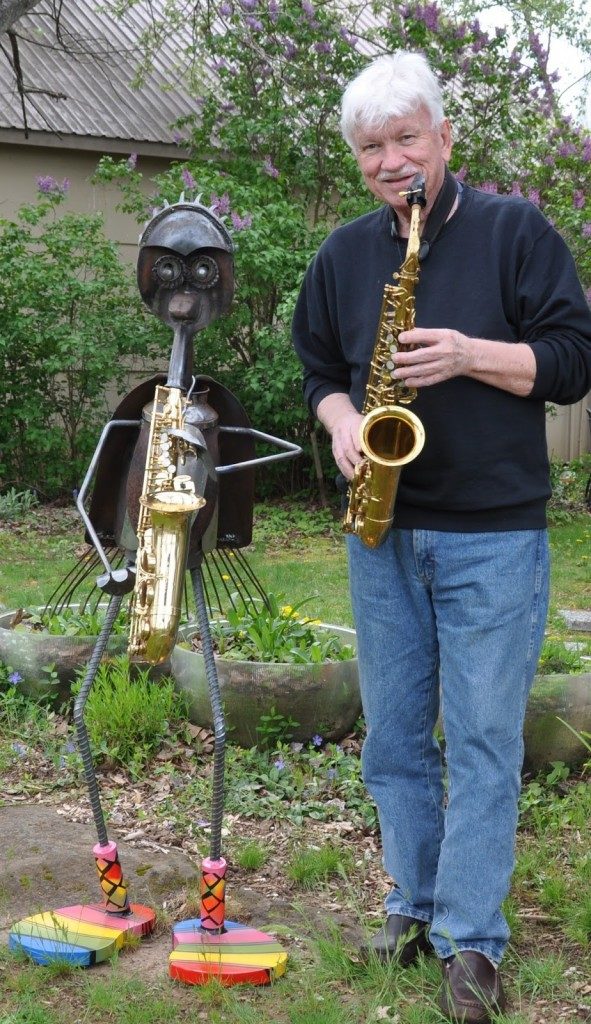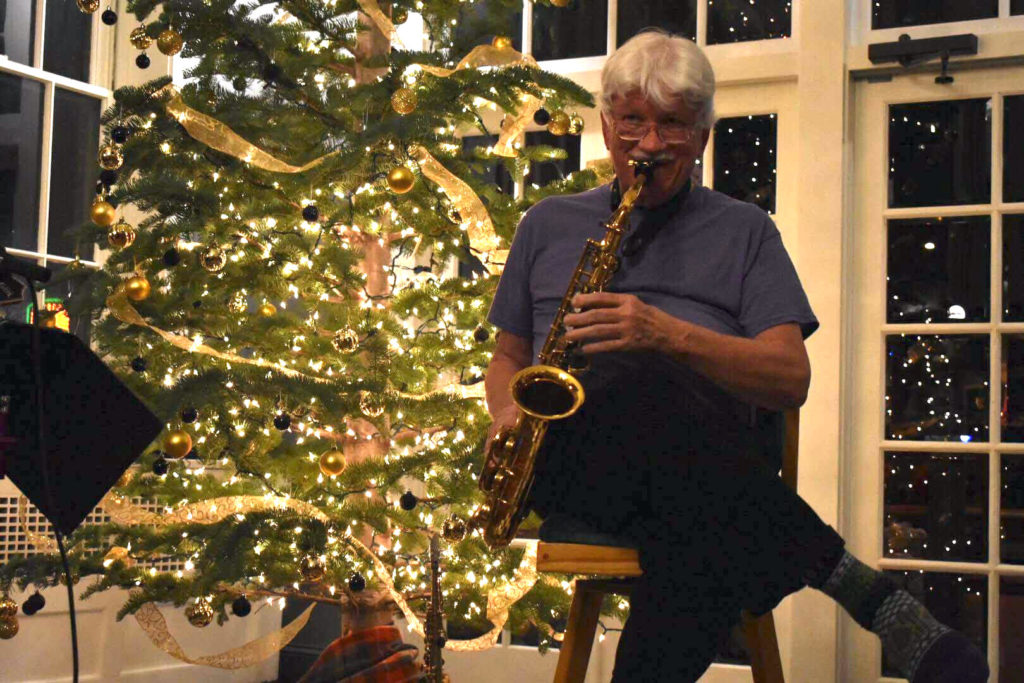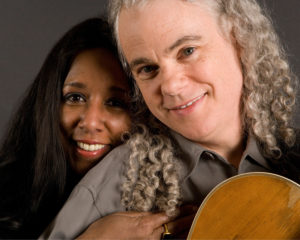
Mike Stillman and friend.
I learned of Michael Stillman’s long illness when Stanford Prof. Makota Ueda died last summer. The prominent haiku scholar was a critic and biographer of Japanese poets. But one link in the chain of connection leads to another: the Japanese professor was also a mentor and inspiration for poet Michael Stillman, who died on Jan 12 at 80 years old, having survived the decade into 2021. Mike studied the haiku tradition under Ueda.
I had met Mike a dozen years ago at (of all places) Stanford’s Archive of Recorded Sound. We quickly discovered we had a mutual friend in Dana Gioia, former California poet laureate and chairman of the National Endowment for the Arts (and also a Stanford alum). Mike was eager to show me his musical and literary preoccupations – as he wrote me: “not only the recordings project but the publications and activities associated with the Stanford Jazz Workshop and the Computer Center for Research in Music and Acoustics [a.k.a. CCRMA]. You may not be aware that I have published about twenty poems in prominent journals and textbooks, including “In Memoriam John Coltrane,” which now appears in about seven anthologies, one of them edited by Dana Gioia and X. J. Kennedy. Also I’ve been making recordings of soprano saxophone jazz and duo performances with piano that you might like to hear.” He had his fingers in a lot of pies, to put it mildly. Our long-ago acquaintance was all-too-brief.
Dana has written a short remembrance for a poet he thinks should stick in the public memory longer:
The poet Michael B. Stillman was one of the truly talented poets I knew at Stanford back in the 1970s, though he gradually wandered away from poetry. He was also a terrific saxophonist and a doctoral candidate in English. He never finished his dissertation on Charles Tomlinson.
Mike played sax in a jazz duet around the Bay Area with a guitarist, Tuck Andress. One night Tuck met and fell in love with Patti Cathcart to form the famous Tuck and Patti duo. Mike ended up in Las Vegas playing back-up for rock bands. He had other jobs. He and his wife Sally helped run the Montalvo Arts Center and the Djerassi Foundation. They never stayed anywhere too long; they were bohemians. At the time of Mike’s death they were living in rural Washington. Mike was still playing music professionally. (He lived to see their sixtieth wedding anniversary.)
At Stanford Mike worked on a dissertation under Donald Davie. In the familiar manner of graduate students, he did everything but write it. He was house master of Branner Hall. He played jazz at Ironworks on El Camino. He recorded visiting speakers at Stanford.
His tapes are now in the Stanford Library. He even issued a series of superb long-playing records of poets and novelists reading their works. This series documents many of the best writers the Stanford community has produced– such as Yvor Winters, Janet Lewis, N. Scott Momaday, J.V. Cunningham, and Donald Davie. He also captured visiting writers, including Adrienne Rich and John Hawkes. Each LP had a fine short essay about the writer on the back cover.

Many fingers, many pies. (Courtesy Sally Stillman)
He also recorded an interview I did with John Cheever that was published in a short form in Sequoia. The full version appears in my book of literary memoirs, Studying with Miss Bishop. I sent him an early copy.
At Stanford Mike studied with the haiku scholar Makoto Ueda. He used to carry Ueda’s anthology, Modern Japanese Haiku around with him as his personal vademecum. Mike began to write almost entirely in haiku for several years. He produced a remarkable book of haiku, An Eye of Minnows, which I actually reviewed for the Stanford Daily in 1976. He did something remarkable with the form.
He used the haiku as a stanza for lyric poems–keeping its imagistic structure but allowing it to form larger units of meaning. The book, now completely forgotten, was remarkable.
I have consistently anthologized one of Mike’s poems, which has been picked up by quite a few other editors over the years. Here is the sort of work that Stillman once did. Like so many multi-talented people, he couldn’t focus on one thing for too long. Each stanza is a haiku. I was glad to lodge one of his poems into public memory.
In Memoriam John Coltrane
Listen to the coal
rolling, rolling through the cold
steady rain, wheel onwheel, listen to the
turning of the wheels this night
black as coal dust, steelsteel, listen to
these cars carry coal, listen
to the coal train roll.

Jazz duo Tuck & Patti (Photo: Thisisshun)
As a poet, Mike has been forgotten by the world. Most poets are forgotten, but I remember his singular work. He wrote a great deal of fine poetry which has never been collected in books.
Postscript: Jazz scholar Ted Gioia also shared a story about Michael Stillman, elaborating on the jazz duo: “Michael was responsible for the famous husband-and-wife- jazz duo Tuck and Patti meeting—when he hired guitarist Tuck Andress and singer Patti Cathcart for his band. Years later Tuck and Patti were not just a married couple but a hit musical act, with their debut album on the Windham Hill record label rising to the top of the jazz radio airplay chart. Mike might have shared in that success, because he wrote lyrics to a jazz song that they recorded for the album. But at the last minute the track had to be dropped from the album because the estate of the composer refused to give permission. Without rights to the song, Tuck and Patti couldn’t feature Mike’s lyrics. I can’t help thinking this was emblematic of Mike Stillman’s career—he was involved in so many seminal creative pursuits, but almost always behind the scenes, and getting very little credit himself.”
Tags: "Dana Gioia", Michael Stillman, Ted Gioia

